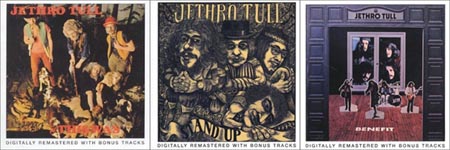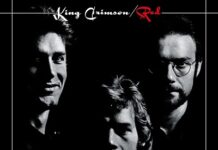Jethro Tull started out as a basic blues band with a secret weapon: a wild-eyed, flute-wielding jester of a front man in a crusty overcoat. It wasn’t an easy sell — there has never been anything particularly fresh-faced and cutesy wutesy about Ian Anderson or his Tullian band mates. But it explains where their priorities were — first and foremost, it was about what lies between grooves. If you look at the band’s early efforts, there isn’t much of a compromise in terms of commercial viability. The young Tull is raw and feisty, but also testing the waters and making inroads to unexplored territory. Now, re-released and remastered with bonus tracks and liner notes personally inscribed by Anderson, This Was, Stand Up and Benefit, the first three Jethro Tull albums, demonstrate the primitive stirrings of the quirky English ensemble. They remain a testament to the legacy of one of the most original rock and roll bands in history.
First released in 1968, This Was is an uncharacteristic debut. The cover depicts the four band members dressed as a bunch of dirty old men surrounded by dogs — hardly a flattering portrait of a new pop phenomenon. The music sounds spontaneous yet seasoned, soaking in heavy strains of blues and jazz. Guitarist Mick Abraham, the group’s blues mentor who left shortly after the album’s release, is a dominant force on many numbers, including the opener “My Sunday Feeling,” “It’s Breaking Me Up” and “Cat’s Squirrel.” For all that Abraham offered, however, the sheer veracity of Anderson’s talent as a singer, songwriter and instrumentalist gives This Was an incomparable quality. Together with bassist Glen Cornick and drummer Clive Bunker, Tull swings far and wide on such tunes as “Beggar’s Farm,” “Serenade To A Cuckoo,” “Dharma For One,” and the first of many songs about Anderson’s friend and one-time bassist Jeffery Hammond-Hammond, “A Song For Jeffrey.” With an odd batch of three bonus tracks, This Was is a great place to start.
For Stand Up, Tull flexes a little more muscle in their approach. With new guitarist Martin Barre in tow, “A New Day Yesterday” jump starts the proceedings on a very hard-hitting note. Suddenly, the group assumes an organic pose, playfully tossing and turning through “Jeffrey Goes To Leicester” and reinterpreting Bach on “Bouree.” Stylistically, “Back To The Family,” “Look Into The Sun,” “Nothing Is Easy,” “Fat Man” and “For A Thousand Mothers” pretty much represent the JT sound fans have grown to love and worship. Four exceptional bonus tracks make this collection a must-have. Along with the single “Living In The Past,” the steady roll of “Driving Song,” the drama of “Sweet Dream,” and the brassiness of “17” fill out the disc nicely. While the reissue lacks the original pop-up center gatefold, it more than makes up for it with a clean and punchy sound.
The last of the trilogy, Benefit remains one of the band’s most eloquent statements. Augmented by keyboardist John Evan, many of the songs are richer in their delivery. “With You There To Help Me” is a cosmic centrifuge, a stark melody underscored by Anderson’s harrowing flute work and Barre’s angular guitar attack. Mostly, however the record is marked by its contrasts — the attentiveness of something like “For Michael Collins, Jeffery and Me” hangs in heavy balance to tomes like “Son” and “To Cry You A Song.” Capping off the CD are four bonus tracks including a UK mix of “Teacher.” In the liner notes, Anderson dedicates the remastered version of Benefit to departing bassist Cornick and the newly recruited Evan. At this juncture, he’s also keen to remind everyone of what came next: Aqualung, Jethro Tull’s initiation into the big league and the beginning of an unprecedented run of musical collages. Incredibly, the Jethro Tull saga continues unabated.
~ Shawn Perry




















